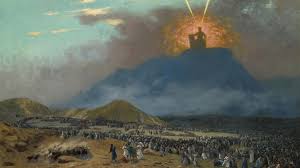The People Began to Mourn
and No One Put On any Ornaments
33: 1-6
The people began to mourn and no one put on any ornaments DIG: Why does God say he will not go with the people, but sends an Angel instead? In this decision, which is good news? Bad news? How will God resolve this dilemma? If God does not go with Isra’el through the wilderness, what are their prospects physically? Emotionally? Spiritually?
REFLECT: How has God kept His promises to you in the midst of your rebellion against Him? What separates us from God? How can we regain our fellowship with Him? Knowing that He will never leave us or forsake us (Hebrews 13:5), does it sometimes feel however, that He has left your presence? What can you do?
The intercession of Moses not only led to the softening of the wrath of God, but also to the reaffirmation of the covenant promise of the Land. ADONAI promised that He would fulfill the oath that He gave the patriarchs when He said: Leave this place, you and the people (not My people) you brought up out of Egypt, and go up to the Land I promised on oath to Abraham, Isaac and Jacob. I will send an ordinary angel (not My Angel) before you and drive out the Canaanites, Amorites, Hittites, Perizzites, Hivites and Jebusites. Go up to the Promised Land flowing with milk and honey (33:1-2). The Septuagint, or the Greek translation of the TaNaKh highlights the separation between God and His people by the translation. It says: He will drive out the Canaanites, and so on, referring to the angel as the one who would fulfill the promises of God. ADONAI would accomplish His purposes, but not in a wholehearted manner, only from a distance.682
We are left with the strong impression, by the book of Exodus, that Moses and God enjoyed an unusually intimate relationship. Earlier, God assured Moses of his personal presence (3:12), and power (4:15-17), so Moses was no doubt surprised when God added that He would not continue with him.683 The whole purpose of the exodus was for God to dwell with His people in the Tabernacle. So when He said, “Go ahead, but you’re going without me,” it wasn’t merely a setback, it was the end of the road. ADONAI gave two reasons for His decision, they were a stiff-necked people and He might destroy them on the way (33:3).684 That meant that all the instructions for building the Tabernacle were canceled. He would drive out the Canaanites and He would not destroy Isra’el, but He would not dwell among them either.

Having broken the covenant they had made only a few weeks before (19:3-9, 24:4-8), the people’s response was appropriate. They began to mourn and strip off their ornaments at Mount Horeb. This was a hopeful sign, because the removal of the ornaments implied a change of heart (Genesis 35:4 and Ezeki’el 26:16). From the tomb paintings in Egypt, it was known that both men and women wore various types of ornaments. From this point on, however, they did not wear them during their wilderness wanderings (33:4-6). As a result, we are left somewhat in limbo at this point in the story. We don’t really know what will happen to Moses or the Israelites. But for now, the worst was over. Moses had interceded for the people and God was appeased. There was a collective sigh of relief, but the relationship had not yet been fully restored.685
John Chrysostom, the archbishop of Constantinople and an important father of the faith, once commented, “To be separated from God is greater punishment than a thousand hells.” No wonder the Hebrews went into great mourning over God’s decision not to go with them. There is no greater punishment in the universe than separation from the love of God.686



Leave A Comment